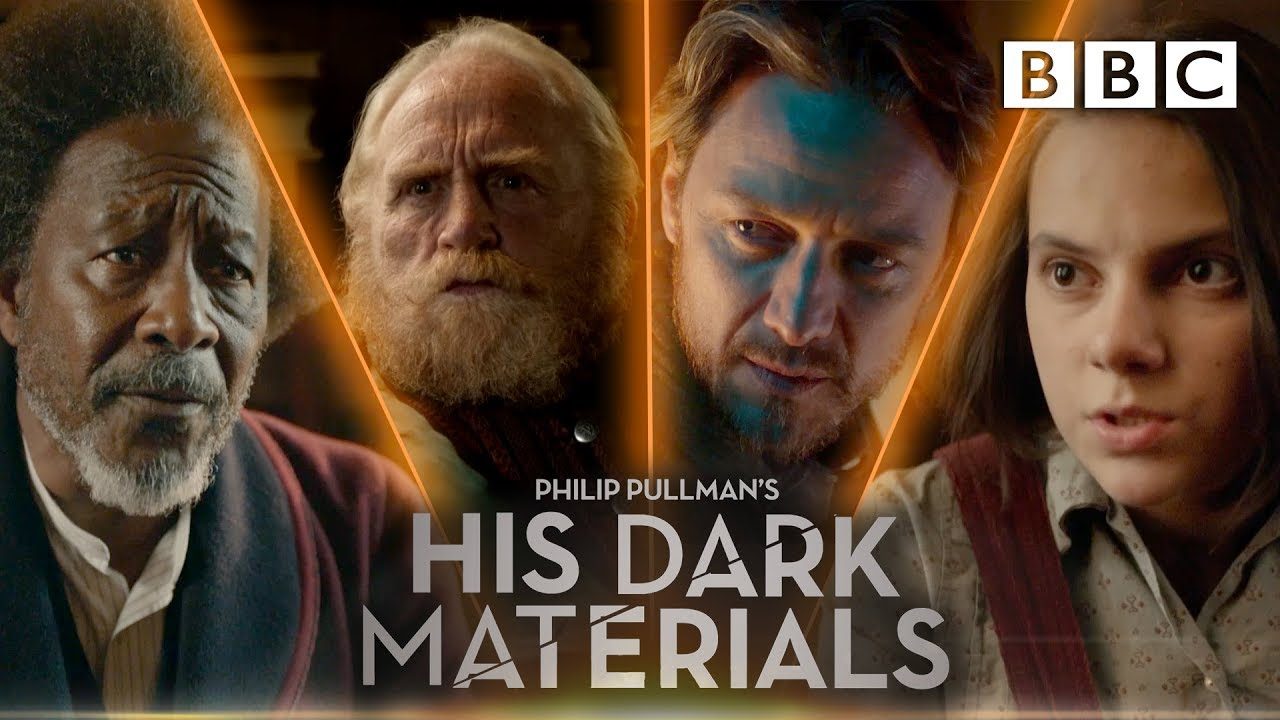His Dark Materials (2019)

His Dark Materials (2019) is a television adaptation of Philip Pullman’s critically acclaimed fantasy trilogy. This series, developed by Jack Thorne and broadcast by BBC and HBO, brings to life Pullman’s richly imagined world of parallel universes, profound philosophical questions, and intricate character dynamics. This essay delves into the thematic depth, narrative complexity, and character development within the series, exploring how it addresses concepts of freedom, identity, and the nature of authority.
His Dark Materials follows the adventures of Lyra Silvertongue (played by Dafne Keen), a young girl living in a world where every human has a “dæmon”—a shape-shifting animal companion that reflects their inner self. Set against the backdrop of a multiverse, the series begins with Lyra’s quest to uncover the truth about her missing friend and the sinister organization known as the Magisterium. Her journey leads her into a complex and perilous world where she encounters various allies and adversaries, including the enigmatic Lord Asriel (James McAvoy) and the fierce warrior, Iorek Byrnison (voiced by Joe Tandberg).
As Lyra explores the mysteries surrounding Dust, a mysterious substance with profound implications, she becomes embroiled in a battle that spans multiple worlds and challenges the very fabric of reality. The series deftly navigates themes of power, control, and the struggle for freedom, all while maintaining a focus on personal growth and the search for truth.

One of the central themes of His Dark Materials is the critique of authoritarianism and institutional control, represented by the Magisterium. The Magisterium is a powerful and oppressive force that seeks to control knowledge and suppress dissent. This theme resonates with contemporary issues of censorship, state control, and the struggle for intellectual freedom.
The series portrays the Magisterium as an all-encompassing institution that exerts influence over every aspect of society. Its control over information and its manipulation of religious and political ideologies serve as a critique of real-world institutions that seek to limit personal freedom and intellectual exploration. Lyra’s rebellion against this oppressive force symbolizes the broader struggle for liberation and the quest for individual autonomy.
The mysterious substance known as Dust plays a crucial role in the series’ exploration of metaphysical and existential questions. Dust is linked to consciousness and the existence of parallel universes, serving as a catalyst for the story’s philosophical inquiries. Its connection to human nature and the fundamental questions of existence are central to the series’ narrative.
The concept of Dust prompts a deeper examination of the nature of consciousness and the relationship between the material and spiritual realms. The series explores how Dust influences human behavior, societal structures, and the fabric of reality itself. This metaphysical exploration adds depth to the story, encouraging viewers to ponder the nature of existence and the boundaries between different realities.

The series excels in its portrayal of character development, particularly through the journey of Lyra Silvertongue. Lyra’s transformation from a curious and somewhat naive child into a determined and courageous leader is a central aspect of the narrative. Her personal growth is intertwined with her quest for truth and her challenge against the forces of oppression.
Lyra’s relationships with other characters, such as her dæmon Pantalaimon (voiced by Kit Connor) and her allies like Will Parry (Amir Wilson), further enhance her development. The dynamic between Lyra and Will, in particular, adds depth to the narrative, as their partnership evolves from initial distrust to a deep and meaningful connection.
The series also provides nuanced portrayals of other key characters, including Lord Asriel and Mrs. Coulter (Ruth Wilson). Lord Asriel’s complex motivations and his struggle against the Magisterium reflect the theme of rebellion against oppressive forces, while Mrs. Coulter’s character explores themes of manipulation and maternal complexity. Their interactions with Lyra serve as a catalyst for her personal growth and the unfolding of the central narrative.
His Dark Materials is distinguished by its intricate narrative structure and expansive world-building. The series adeptly weaves together multiple storylines and parallel universes, creating a rich and immersive experience. The detailed world-building, from the concept of dæmons to the depiction of various worlds and cultures, adds authenticity and depth to the story.

The series’ visual and thematic elements contribute to its immersive quality. The portrayal of parallel worlds, the depiction of the Magisterium’s control, and the visual representation of Dust all enhance the narrative’s impact. The careful attention to detail in world-building helps bring Pullman’s imaginative universe to life and engages viewers in the complexities of the story.
The series raises important ethical and philosophical questions, particularly regarding the nature of authority, freedom, and the role of individual agency. The conflict between the Magisterium and the forces of rebellion reflects broader societal debates about the balance between authority and personal freedom.
The philosophical underpinnings of the series, particularly in relation to Dust and consciousness, encourage viewers to reflect on the nature of existence and the implications of scientific and metaphysical discoveries. The series invites viewers to consider the impact of knowledge, power, and control on human nature and society.
His Dark Materials (2019) is a compelling adaptation of Philip Pullman’s beloved trilogy, offering a rich and multifaceted exploration of themes such as authority, freedom, and the nature of existence. Through its intricate narrative, well-developed characters, and thought-provoking philosophical inquiries, the series provides a profound commentary on the struggle for liberation and the quest for understanding. Martin Scorsese’s adaptation successfully captures the essence of Pullman’s work, creating a visually and intellectually engaging experience that resonates with contemporary issues and timeless questions.











